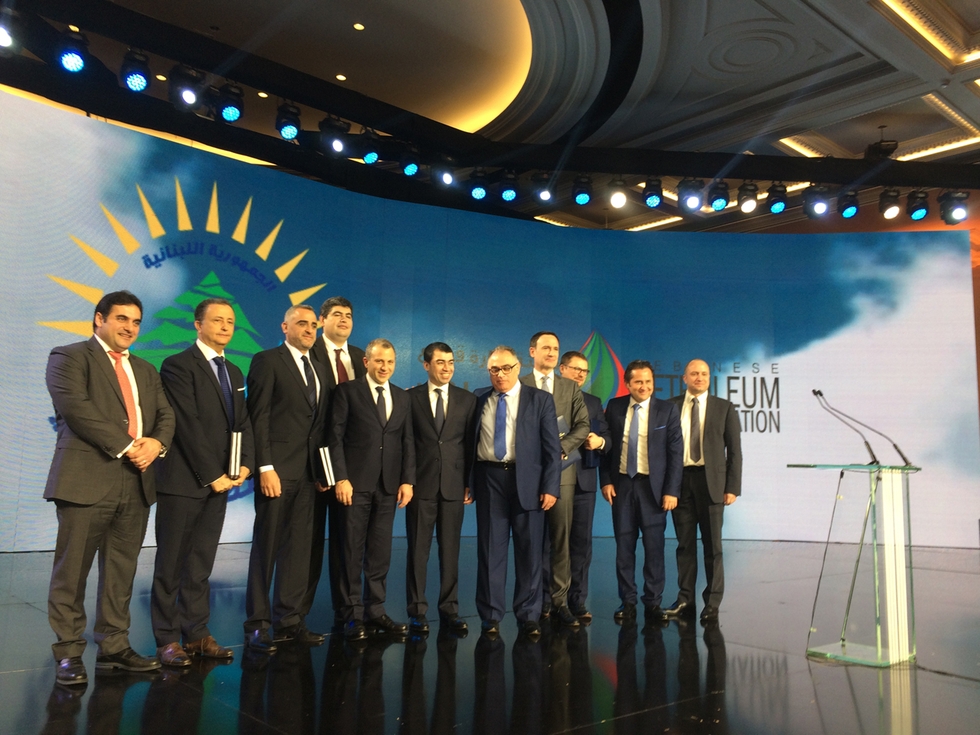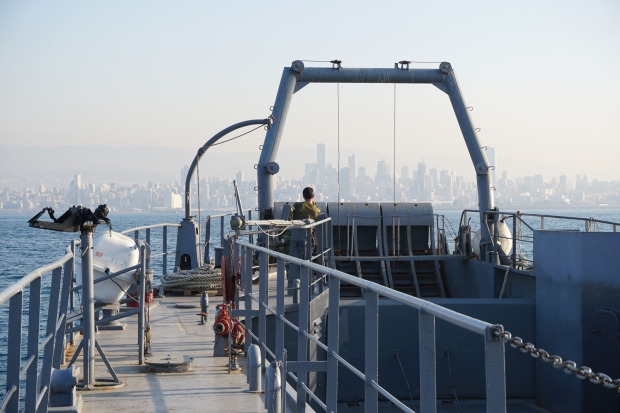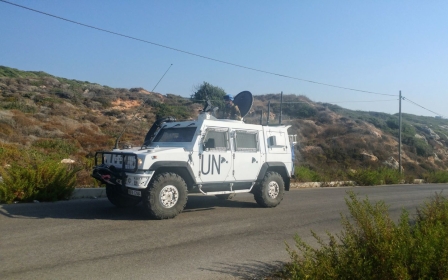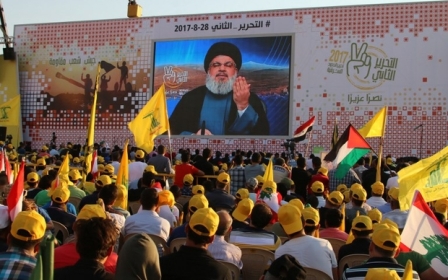Lebanon's first offshore energy contracts spark security, diplomatic dilemmas

BEIRUT - Lebanon formally signed off on its first offshore oil and gas contracts on Friday.
The contracts were originally agreed in January 2017 with a consortium of international oil giants - French Total, Italian ENI and Russian Novatek - during an official ceremony in its capital, Beirut.
The exploration of Lebanese offshore oil and gas has been a project long in the making, frequently halted by political tensions in the country. But the main issue now lies along its southern border with Israel, which has been extracting its offshore gas for several years.
Even though experts refuse to give hypothetical figures for Lebanon’s reserves, the country is betting on oil and gas to solve some of its many economic issues, including a debt to GDP ratio of roughly 150 percent.
After Friday's ceremony, the consortium can begin exploring two blocs off the coast. One of them, bloc 9, is partly situated in an 860 square kilometre stretch of sea that is subject to a border dispute with Israel.
"The race to export markets is a major challenge, especially that the Israeli enemy started petroleum production and is seeking to build energy alliances with countries in the region as well as with Europe," proclaimed a short video prepared by the Lebanese government at the official signature ceremony, which was attended by several hundred dignitaries, including President Michel Aoun.
Earlier this year, Israeli Defence Minister Avigdor Lieberman described Lebanon's offshore oil and gas exploration tender process as "highly provocative".
"Respectable firms" bidding on the tender, he said are "making a grave error - because this is contrary to all of the rules and all protocol in cases like this".
The Lebanese president reacted by saying that Lieberman’s comments were "a threat to Lebanon and its right to sovereignty over its territorial waters".
"Israel's recent declarations are obvious attacks," Khalil Helou, a retired Lebanese army general, told Middle East Eye. According to him, these kind of statements are directed at Hezbollah, the Iranian-backed Lebanese party, which also fights in support of Bashar al-Assad's government in Syria.
"They're sending a message to Hezbollah. They don't want Lebanon to generate income, which they think would be diverted to Hezbollah's war effort," he said. Tensions between Israel and Hezbollah are high. Israeli media interpreted a recent tweet by Israeli Prime Minister Benjamin Netanyahu as one of the many signals that Israel is ready to attack the party.
Securing the wells
Drilling extraction wells is set to begin next year. Once the platforms are brought in, their protection will be assured by Lebanon's military. However, the country's armed forces, specifically its navy, lack the manpower and equipment to protect the extraction wells.
Maroun Jreich, a lieutenant in the navy who patrols the coast several times a week, told MEE that Lebanon needs 10 to 15 extra warships. The exact needs of the navy were detailed in a written response from the Direction of Orientation, the army’s press office: "Three 50-60 metre boats; four 40-50 metre boats; seven 20 to 30 metre boats; the creation of a research centre as well as search and rescue capabilities."
"We have to keep in mind that an attack can happen any day, so we must always be ready," he said.
Requests like these will be presented by the army at the Rome conference, which is scheduled to take place on 28 February, and is aimed at garnering international support for the Lebanese army.
"Lebanon potentially becoming an offshore energy producer places additional pressure on the country to modernise its navy and match its capabilities to a changing mix of requirements tied to oil and gas safety," said Aram Nerguizian, a senior associate at the Center for Strategic and International Studies (CSIS) based in Washington.
"When multinational companies come to Lebanon, they expect international standards to be accommodated, such as the ability to rapidly deploy rotary aircrafts to offshore platforms to either deal with fire or medical hazards."
Diplomatic tensions
In addition to security challenges, Lebanon also faces diplomatic challenges with its neighbours.
According to Mona Sukkarieh, co-founder of Middle East Strategic Perspectives, a Beirut-based political risk consultancy, no new mediator has been appointed since Donald Trump was elected president of the United States.
Nerguizian of CSIS said that the recent inflammatory rhetoric between Lebanon and Israel is a game of "classic deterrence".
"Fundamentally, I see no reason as to why either side would want the maritime dispute to escalate. It's in both Lebanon's and Israel's national interest to export energy in a competitive way, which means they have to find ways of moderating their behaviour to attract and retain large oil and gas companies' engagement. These companies know this."
Stephan Michel, the head of Total’s exploration and production department in the Mena region, adopted a conciliatory tone during a panel discussion on Friday's official ceremony in Beirut.
It’s in both Lebanon’s and Israel’s national interest to export energy in a competitive way
- Aram Nerguizian, senior associate at the Center for Strategic and International Studies
"Our target is to first drill a well in bloc 4 (off Lebanon’s northern coast)," he said. "Then we will move to bloc 9 (the disputed area in Lebanon’s southern waters). Just one word on that: it is clear that the part we target is north of the bloc, and more than 25 km away from the border."
Walking out of today's ceremony with the signed contracts in his hands, Walid Nasr, the head of the Lebanese Petroleum Administration, the government's body in charge of oil and gas, expressed optimism when asked whether Israeli threats had in any way deterred Total, ENI and Novatek.
"You saw the companies are here today," he said. "We have our agreements. I think we are moving on. This is a major milestone for Lebanon."
However, political tensions are not Lebanon’s only problem. Exporting offshore oil and gas in the region has proven historically difficult.
"Cyprus has not been able to commercialise the gas, which was found in its territorial waters, as its market is too small to justify the development of the field. Only Israel has been able to and uses the gas to supply its local power grid," said Sukkarieh of Middle East Strategic Perspectives.
"It's too early to discuss exports, it depends on the findings," said Nasr. "But the local market is a priority, particularly our electricity sector. Then, exports can follow."
For him, the easiest solution would be exporting through the Arab gas pipeline, which connects Lebanon to Syria and Egypt.
"We hope that by 2020, 12 percent of power generated will come from renewable resources, and the rest form natural gas."
Middle East Eye propose une couverture et une analyse indépendantes et incomparables du Moyen-Orient, de l’Afrique du Nord et d’autres régions du monde. Pour en savoir plus sur la reprise de ce contenu et les frais qui s’appliquent, veuillez remplir ce formulaire [en anglais]. Pour en savoir plus sur MEE, cliquez ici [en anglais].





